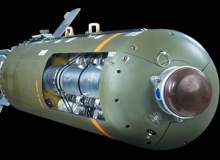
Cluster bombs have been widely condemned for causing thousands of civilian deaths, some many years after the weapon was used in combat. Some of the submunitions, or bomblets, they release can remain unexploded on impact until triggered by passersby. Despite 112 states signing up to the international Convention on Cluster Munitions that prohibits their use, transfer and stockpiling, free trade persists among non-signatories.
Earlier this week, Saudi Arabia placed an order worth over $640 million with US weapons giant Textron Defense Systems for 1,300 units of its CBU-105 air-launched "Sensor Fuzed Weapon" (SFW) cluster munition. India bought 512 of the same model in 2005. Needless to say, all three countries are non-signatories.
According to campaign group Cluster Munition Coalition (CMC), Israeli cluster bombs used in Lebanon in August 2006 resulted in more than 200 civilian casualties in the year following the ceasefire. CMC also says they caused more civilian casualties in Iraq in 2003 and Kosovo in 1999 than any other weapon system.
In 2008, the year the Convention on Cluster Munitions was adopted, the Pentagon issued a cluster munitions policy arguing that their use is, in fact, a more humane alternative to traditional weapons. The policy states: "Because future adversaries will likely use civilian shields for military targets – for example by locating a military target on the roof of an occupied building – use of unitary weapons could result in more civilian casualties and damage than cluster munitions. Blanket elimination of cluster munitions is therefore unacceptable due not only to negative military consequences but also due to potential negative consequences for civilians."
Textron argues that its SFW is far superior to older, legacy cluster weapons, as it uses a number of fail-safes to ensure no unexploded ordnance poses a danger to civilians. The SFW carries the company’s BLU-108 submunition armed with smart warheads called Skeet that use advanced sensors to detect a valid target. If a Skeet warhead does not detect a target, three safety measures ensure it self-destructs in the air or is rendered inert by a timeout device.
The company website says the SFW delivers greater than 99% reliability. With each of the 1,300 units sold to Saudi Arabia containing 10 submunitions, each with four Skeet warheads, that still means around 500 warheads could remain unexploded and pose a danger to civilians.
However, Textron claims the dud rate is closer to zero, and its SFW marketing material quotes explosive ordnance disposal (EOD) specialist Bob Gravett as saying: "There is not one recorded instant of the SFW causing a single civilian casualty… I think it says a lot for the effects of the civilian population and the humanitarian impact by this weapon system on a community is negligible."
Ultimately, the only way to verify whether this new generation of cluster bomb lives up to its humanitarian claims would be for it to be used extensively in combat and for no civilian casualties to result from unexploded bomblets. Only then will we know whether calls for a truly worldwide ban are justified or whether the cluster bomb has earned the right to rehabilitation.ber


